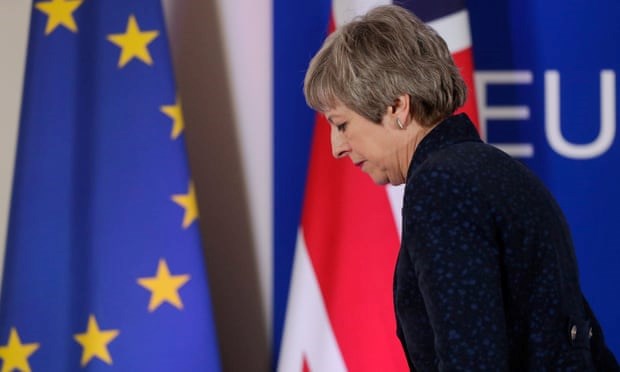
Wednesday March 27, 2019
Exclusive: Date was to be offered at leaders’ summit if May had sought a longer delay

Theresa May only asked for a delay until 30 June in her letter. Photograph: Stéphanie Lecocq/EPA
The EU has pencilled in April Fools’ Day 2020 as a leading option for
Britain’s first day outside the bloc, should the UK government ask
Brussels for a lengthy extension of article 50 in three weeks’ time, it
can be revealed.
The date was to be offered at the leaders’ summit last week if
Theresa May had followed through on her promise to request a short
extension in the event of passing her Brexit deal, and a longer one should it be rejected again by the House of Commons.
Such was the disapproval of her cabinet, the prime minister only
sought a short delay until 30 June in her formal letter. She was
subsequently given an unconditional extension until 12 April, or a longer one to 22 May in the unlikely event of the withdrawal agreement being ratified this week.Without having received a request from Downing Street for a prolonged
extension, the EU’s leaders instead left open the offer of a lengthy
delay should there be a new political process or event before 12 April,
such as a general election or second referendum, but they did not
stipulate its potential length.
A one-year extension, ending on 31 March 2020, was, however, written
into internal EU papers before the summit as an offer that could be made
to May should she formally seek a longer extension, sources said. It
will likely remain an option if May comes back to Brussels having failed
to ratify her deal.
Such a UK departure date would ensure the British government would
not have any opportunity to meddle in the EU’s long-term plans,
including its budget, sources suggested.
“That would safeguard our work during this year and basically allow
us to turn to it again early next year,” the official said. “Giving more
than that time runs the risk of mischief by the UK. We have seen the
talk of Brexiters of trying to stay in and cause trouble. So such a time
limit is not a bad idea.”
Sources emphasised that no decision had been made and it would be the subject of intense debate among the leaders at a summit, likely to be held on 10 April in Brussels, should May come back again for extra time.
“It will be at least until the end of the year, certainly,” the
official said of the extension. “We don’t want to come back in October
on this. We want to do other things and not have this dominate.”
The source added: “It may be up to two years, but that is the span of
the imagination of those who are talking about a long extension. It is
not up to this October because we can’t do this all the time. We do need
time to do other things. And that is one of the attractions of a long
extension. We can put it to one side and do other things.”
The new timelime emerged as Guy Verhofstadt hailed Saturday’s Put it to the People march in London and a petition with more than 5m signatures calling for article 50 to be revoked.
The European parliament’s lead Brexit negotiator said he was very pleased MPs had voted to take control of Brexit from the government.
“We see at the moment a real Brexit revolt,” he said. “Until now, all
the Commons votes have been against something. This is the first time
that there is a vote for something – cross-party cooperation. We have
long called for that.
“It is possible now to work for cross-party proposals and an alliance
that could change the political declaration fundamentally. It is very
important that this cross-party cooperation will start and I hope it
leads to proposals that can be backed by a majority.”
Philippe Lamberts, an MEP on the parliament’s Brexit steering group
and a co-leader of Green MEPs, offered a damning analysis of May’s
leadership.
“Theresa May might be tempted to play [a] scorched-earth policy and
say: ‘Whatever parliament wants, I won’t do it,’” he said. Lamberts
added that May had even managed to upset Luxembourg’s prime minister,
Xavier Bettel, whom he described as “Mr Nice Guy”, suggesting the
British prime minister “must be totally devoid of the basic human skills
you need to be a political leader”.